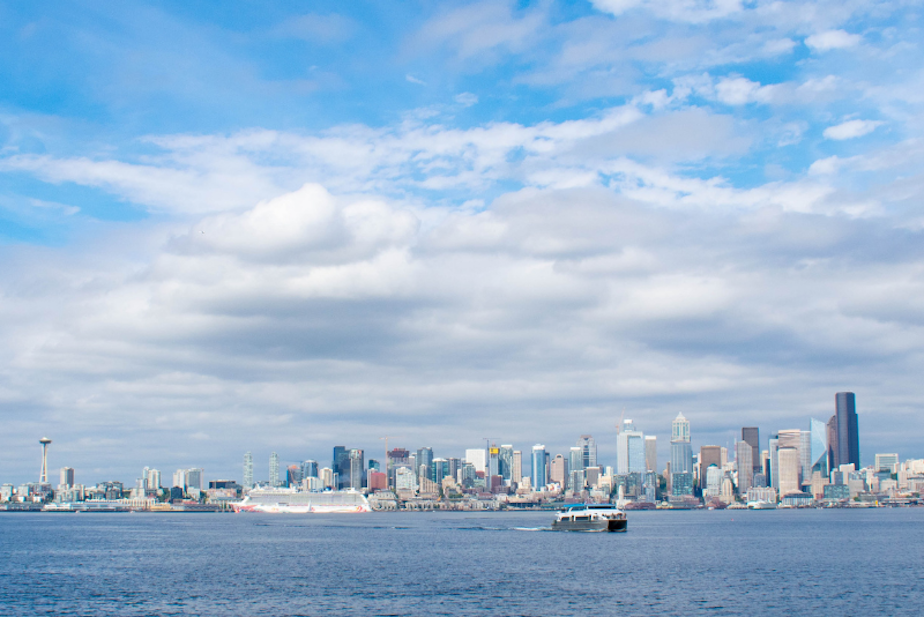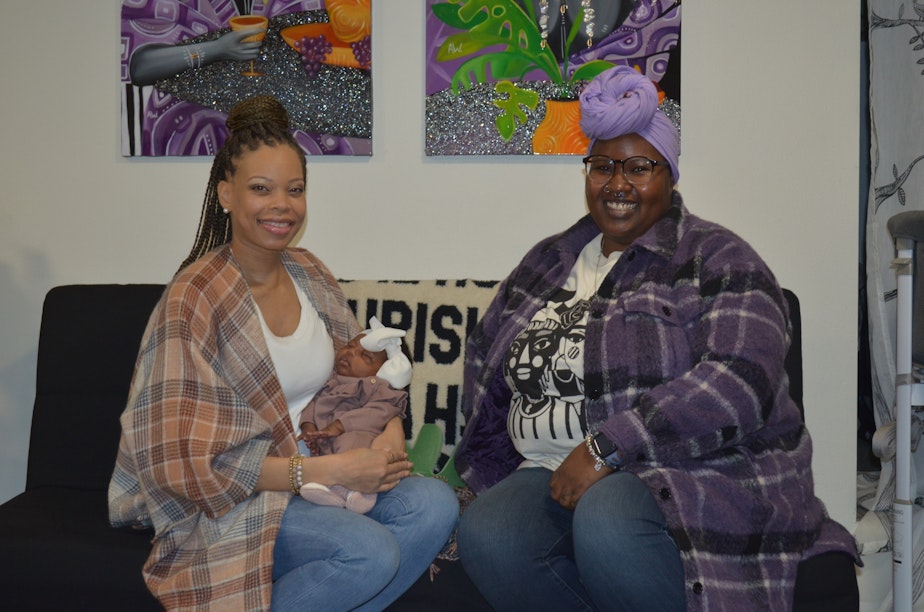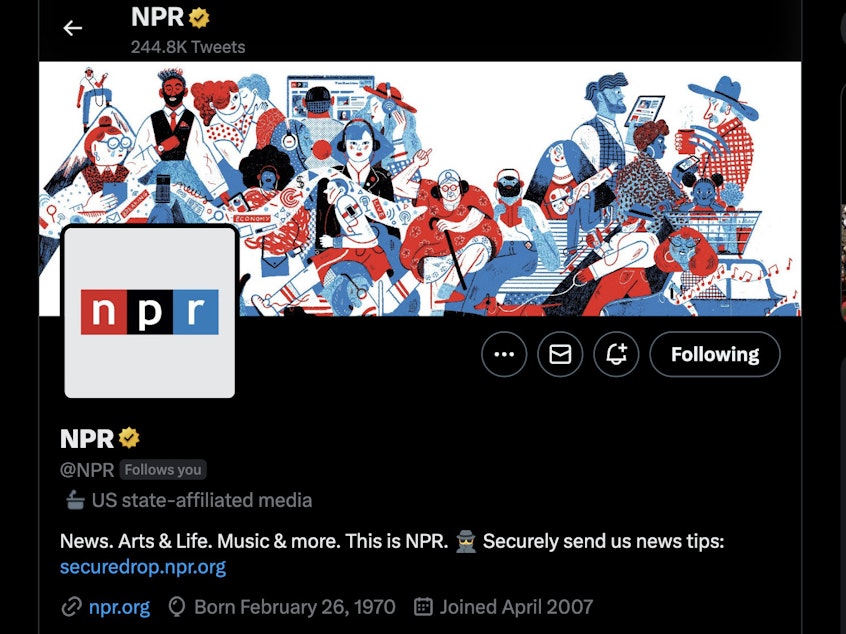Should Seattle have a 'no idle zone' for cruise ships?: Today So Far

- The Port of Seattle is working toward a bold new policy for the many cruise ships that frequent our shores — they have to plug in.
- About $28 million in Washington state is now slated to address food insecurity.
- It appears that most Seattle City Council members support Mayor Bruce Harrell's goal of a $1 billion housing levy.
This post originally appeared in KUOW's Today So Far newsletter for April 6, 2023.
The Port of Seattle is working toward a bold new policy for the many cruise ships that frequent our shores — they have to plug in.
Right now, when a cruise ship ties up in Seattle and drops off its many passengers, it's likely idling its engines to keep its own electricity running. This is like when you pull into your driveway, but can't turn off your car because you need your radio on to finish listening to a story on 94.9 KUOW. Unlike your tiny car engine, however, cruise ships have massive engines that can spew tons of carbon pollution into the air. An option to get around this is to simply have them plug into power on the shore and turn their engines off.
"We are working towards having all of our cruise ships plug in. It will be a requirement by 2030, if not sooner," Stephanie Jones Stebbins with the Port of Seattle told Soundside.
This is already an option for ships, but participation has been low — 37% of ships in 2021, and 21% in 2022. Stebbins notes that not all cruise ships have the ability to plug in, currently, but as that changes, participation is expected to go up. The trips these ships take to Alaska, however, could potentially pump 2,800 metric tons of carbon into the air (That's sciency talk for "a lot"), and there are other ports along the way. Big picture: The Port of Seattle has started an effort toward a "Green Corridor," which aims to decarbonize the Northwest shipping channel. Cruise ships are the first targets for this effort. Soundside has the full story here.
About $28 million in Washington state is now slated to address food insecurity. Lawmakers just passed a bill to make it happen. The money will be funneled to hunger relief organizations. In the Seattle area, one such organization tells KUOW that donations are not keeping up with demand.
“Part of the challenge is that grocery donations have also been down as people are challenged to deal with higher costs of food for their own household tables as well,” said Christina Wong with Northwest Harvest.
The money is coming as a couple factors (among others) are influencing food insecurity in our region. Inflation has been the big one we've all noticed over the past couple years, driving the price of food up and making us all visit multiple grocery stores to find the best price for eggs. The second factor is that over the past few pandemic years, government assistance for things like SNAP (food buying assistance) was increased. That helped as finances were tight. Now, those increased benefits have phased out, meaning less financial assistance for food at the same time prices are up. KUOW's Ruby de Luna has the story here.
It appears that most Seattle City Council members support Mayor Bruce Harrell's goal of a $1 billion housing levy. The mayor's plan is to use the levy to pay for affordable housing and related services.
Seattle's current housing levy (which began in 2016) expires this year, meaning a big chunk of revenue is about to go away. The city has used these funds to pay for an estimated 2,741 rentals. It has also helped low-income buyers purchase a home in Seattle. The new levy is not only being crafted to replace the expiring one, it's doubling down on it. To be more accurate, the current levy proposal is three times larger than the old one.
While the mayor's proposal will likely be favored by the City Council, KUOW's Joshua McNichols points out that each member has their own priorities for the money. Expect a financial tug of war at City Hall as different interests try to pull some funding their way. Councilmember Teresa Mosqueda is bringing up labor. Councilmember Sara Nelson wants consideration for helping small landlords offering affordable housing. And Councilmember Lisa Herbold wants more of the funding to flow into her district in West Seattle. Read the full story here.
AS SEEN ON KUOW

Jazmin Williams (right) is a doula and the founder of Blkbry, which offers perinatal support to Black women in King County. Damarria Davis (left) is a Blkbry doula. Black women in Washington state are three times as likely as white women to die due to pregnancy or childbirth. A report from the state Health Department states that the vast majority — 80% — of maternal deaths in the state are preventable. (Eilis O'Neill / KUOW)
DID YOU KNOW?
More than 100 years ago, retired French soldier Peter Pieri was on the island of Corsica when he happened upon a variety of onion that tasted sweet. He quite liked it, so he picked up some seeds for this onion. Pieri then settled in the Walla Walla Valley around 1900 and planted those seeds. They proved to grow well in the region. Over time, that onion evolved around Walla Walla and became sweeter and bigger. Today, we call it the Walla Walla sweet onion. It is believed that the low sulfur content in that region’s soil helped develop this onion into what it is today.
There are many sweet onions like this across the USA. Only ones grown around Walla Walla can bear the name, or be considered Washington’s official state vegetable. Yep. The Walla Walla sweet onion carries that honor. State lawmakers made it the official state vegetable in 2007 when seventh graders in an honors social studies class at Eatonville Middle School spearheaded an effort to give the onion greater recognition.
The season for our state vegetable is from June through September. It is estimated that about 32,500 pounds of Walla Walla onions are grown per acre, every year.
ALSO ON OUR MINDS

Twitter added a "state-affiliated media" tag to NPR's main account on Tuesday, applying the same label to the nonprofit media company that Twitter uses to designate official state mouthpieces and propaganda outlets in countries such as Russia and China. NPR operates independently of the U.S. government.

